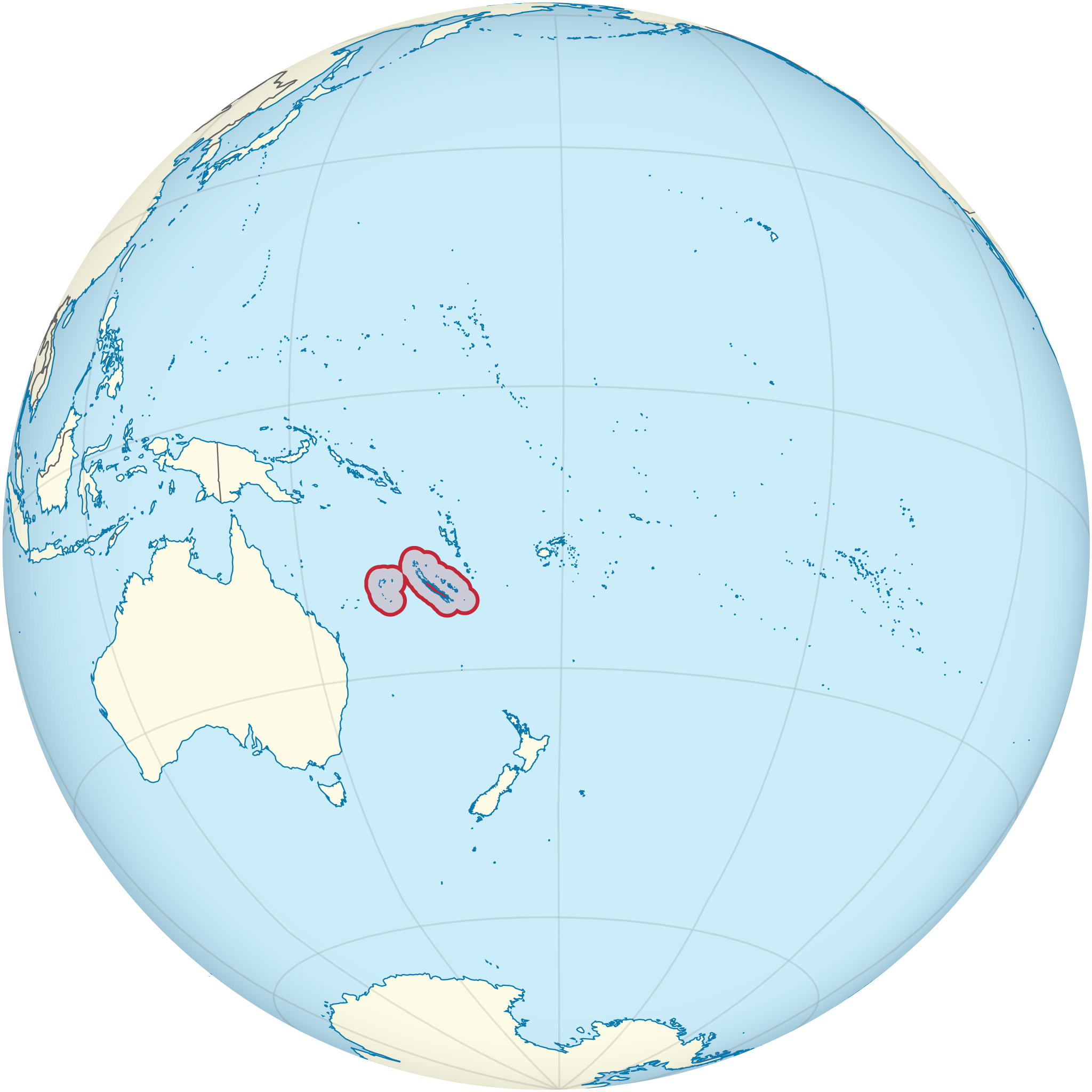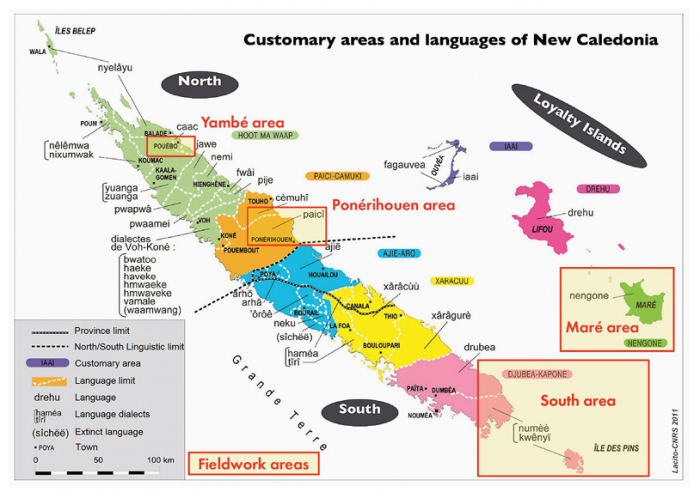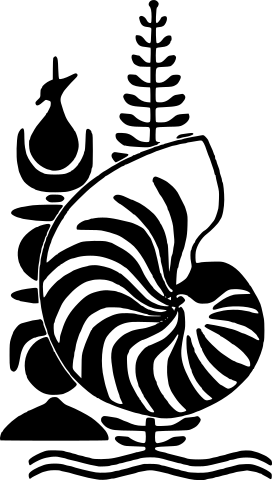More languages
More actions
General-KJ (talk | contribs) (Expanded the article) Tag: Visual edit |
(History) Tag: Visual edit |
||
| (One intermediate revision by the same user not shown) | |||
| Line 1: | Line 1: | ||
{{Infobox country|name=New Caledonia|native_name=Kanaky|image_flag=New Caledonian flag.svg|image_coat=Emblem of New Caledonia.svg.png|capital=Nouméa|largest_city=Nouméa|government_type=Devolved parliamentary dependency|leader_title1=High Commissioner|leader_name1=[[Louis Le Franc]]|leader_title2=President of the Government|leader_name2=[[Louis Mapou]]|image_map=New Caledonia map.png|map_width=320|official_languages=French|area_km2=18,576|population_census=271,407|population_census_year=2019}} | {{Infobox country|name=New Caledonia|native_name=Kanaky|image_flag=New Caledonian flag.svg|image_coat=Emblem of New Caledonia.svg.png|capital=Nouméa|largest_city=Nouméa|government_type=Devolved parliamentary dependency|leader_title1=High Commissioner|leader_name1=[[Louis Le Franc]]|leader_title2=President of the Government|leader_name2=[[Louis Mapou]]|image_map=New Caledonia map.png|map_width=320|official_languages=French|area_km2=18,576|population_census=271,407|population_census_year=2019}} | ||
[[File:Kanaky map.png|thumb|Indigenous groups in New Caledonia]] | [[File:Kanaky map.png|thumb|Indigenous groups in New Caledonia]] | ||
''' | '''Kanaky''', officially known as '''New Caledonia''', is a [[French Republic|French]] [[Settler colonialism|settler-colony]] in the southwest [[Pacific Ocean]]. The [[Kanak and Socialist National Liberation Front]] (FLNKS) has been struggling for [[national liberation]] and independence since the 1980s.<ref name=":1">{{Web citation|author=B. A. Ford|newspaper=[[People's Voice]]|title=Kanaky-New Caledonia independence vote shines light on imperialism in the Pacific|date=2020-10-19|url=https://pvonline.ca/2020/10/19/kanaky-new-caledonia-independence-vote-shines-light-on-imperialism-in-the-pacific/|retrieved=2022-12-22}}</ref> | ||
== Terminology == | |||
New Caledonia is the [[Colonialism|colonial]] name of the islands and was chosen by [[James Cook]] in 1774 based on an old name for [[Scotland]].<ref name=":2" /> | |||
French settlers first used the word 'Kanak' as an insult. In 1969, Chief [[Nidoish Naisseline]] decided to adopt the term 'Kanak' to refer to his own people, leading the French to stop using that term and instead call the natives [[Melanesia|Melanesians]].<ref name=":4">{{Citation|author=Susanna Ounei|year=1985|title=For Kanak Independence|chapter=The Kanak people's struggle for independence in New Caledonia|page=3–4|pdf=https://cloudflare-ipfs.com/ipfs/bafykbzacean27lkjc3azb6uduikg7lvi3xsgcegdya7iok6oseor5tipypvfm?filename=Susanna%20Ounei%20-%20For%20Kanak%20independence_%20The%20fight%20against%20French%20rule%20in%20New%20Caledonia-Corso_%20Labour%20Publishing%20Co-operative%20Society%20Ltd.%20%281985%29.pdf|publisher=Labour Publishing Co-operative Society}}</ref> | |||
== History == | == History == | ||
New Caledonia | === Pre-colonial === | ||
Before colonization, around 200,000 people lived in New Caledonia.<ref name=":4" /> | |||
James Cook became the first [[Europe|European]] to visit New Caledonia in 1774, naming the archipelago New Caledonia.<ref name=":2">{{Citation|author=V. Z. Klepikov|year=1979|title=The Great Soviet Encyclopedia|title-url=https://encyclopedia2.thefreedictionary.com/New+Caledonia|chapter=New Caledonia|section=Historical Survey}}</ref> | |||
== 2021 independence referendum == | === French colonization === | ||
[[French Empire (1852–1870)|France]] took over New Caledonia as a [[Colonialism|colony]] in 1853 and forced the natives into small reservations with infertile land. The French killed thousands of natives when they rebelled,<ref name=":3">{{Citation|author=Susanna Ounei|year=1985|title=For Kanak Independence|chapter=Introduction|page=1–2|pdf=https://cloudflare-ipfs.com/ipfs/bafykbzacean27lkjc3azb6uduikg7lvi3xsgcegdya7iok6oseor5tipypvfm?filename=Susanna%20Ounei%20-%20For%20Kanak%20independence_%20The%20fight%20against%20French%20rule%20in%20New%20Caledonia-Corso_%20Labour%20Publishing%20Co-operative%20Society%20Ltd.%20%281985%29.pdf|publisher=Labour Publishing Co-operative Society}}</ref> reducing the population to only 26,000.<ref name=":4" /> | |||
The archipelago was a penal colony and many members of the [[Paris Commune]] were exiled to New Caledonia after 1871.<ref>{{Citation|author=Robert Aldrich, John Connell|year=2006|title=France's Overseas Frontier: Départements et territoires d'outre-mer|page=46|publisher=Cambridge University Press|isbn=9780521030366|title-url=https://books.google.com/books?id=vRB3woPa7LAC&pg=PA46}}</ref> | |||
In 1878, Chief [[Ataï]] led a rebellion against the [[French Republic (1870–1940)|French]]. Many survivors were exiled to [[Commonwealth of Australia|Australia]] or [[Republic of Vanuatu|Vanuatu]].<ref name=":4" /> | |||
In 1917, Chief [[Noël]] organized against involvement in the [[First World War]]. The French beheaded him and took his head to a museum in Paris, where it remained until the 1980s at least.<ref name=":4" /> | |||
New Caledonia became a French Overseas Territory in 1946.<ref name=":0">{{Web citation|newspaper=[[Peoples Dispatch]]|title=Progressive sections denounce outcome of New Caledonia referendum|date=2021-12-20|url=https://peoplesdispatch.org/2021/12/20/progressive-sections-denounce-outcome-of-new-caledonia-referendum/|archive-url=https://web.archive.org/web/20220116220207/https://peoplesdispatch.org/2021/12/20/progressive-sections-denounce-outcome-of-new-caledonia-referendum/|archive-date=2022-01-16|retrieved=2022-09-09}}</ref> Before then, settlers were allowed to kill any natives who entered settler towns after 9 p.m. without permission from the [[police]].<ref name=":4" /> | |||
=== Anti-colonial movement === | |||
Kanaks first won the right to vote in the 1950s and formed the [[Caledonian Union]] (UC), which demanded autonomy for New Caledonia. In 1977, it changed its goal to full independence. In 1979, the pro-independence forces of the [[Independence Front]] coalition won 83% of the Kanak vote and 35% of the total vote, including settlers.<ref name=":3" /> | |||
In 1984, French Minister of Overseas Territories [[Georges Lemoine]] rejected independence and prevented any independence referendum from being held until 1989. In response, the Kanaks dissolved the Independence Front and formed the FLNKS.<ref name=":3" /> | |||
==== 1984 provisional government ==== | |||
The FLNKS boycotted the 1984 elections and established a provisional government led by [[Jean-Marie Tjibaou]] on 1 December 1984. The French invaded with thousands of troops to crush the rebellion and murdered FLNKS leader [[Eloi Machoro]]. They killed at least 20 natives and took over 100 political prisoners.<ref name=":3" /> | |||
In 1998, the FLNKS signed an agreement with France to extend more rights to indigenous Kanak peoples.<ref name=":1" /> | |||
==== 2021 independence referendum ==== | |||
The FLNKS boycotted a 2021 referendum for independence from France. 96.5% of votes in the referendum were against independence, but only 43.87% of the population voted in the referendum.<ref name=":0" /> | The FLNKS boycotted a 2021 referendum for independence from France. 96.5% of votes in the referendum were against independence, but only 43.87% of the population voted in the referendum.<ref name=":0" /> | ||
== Demographics == | |||
In 1985, the native Kanak population was just over 60,000, and there were 54,000 [[White people|white]] settlers, mostly from France. There were also 30,000 people from other countries, especially from the South Pacific and Southeast Asia.<ref name=":3" /> | |||
== References == | == References == | ||
Latest revision as of 16:09, 3 June 2024
| New Caledonia Kanaky | |
|---|---|
 | |
| Capital and largest city | Nouméa |
| Official languages | French |
| Government | Devolved parliamentary dependency |
• High Commissioner | Louis Le Franc |
• President of the Government | Louis Mapou |
| Area | |
• Total | 18,576 km² |
| Population | |
• 2019 census | 271,407 |

Kanaky, officially known as New Caledonia, is a French settler-colony in the southwest Pacific Ocean. The Kanak and Socialist National Liberation Front (FLNKS) has been struggling for national liberation and independence since the 1980s.[1]
Terminology[edit | edit source]
New Caledonia is the colonial name of the islands and was chosen by James Cook in 1774 based on an old name for Scotland.[2]
French settlers first used the word 'Kanak' as an insult. In 1969, Chief Nidoish Naisseline decided to adopt the term 'Kanak' to refer to his own people, leading the French to stop using that term and instead call the natives Melanesians.[3]
History[edit | edit source]
Pre-colonial[edit | edit source]
Before colonization, around 200,000 people lived in New Caledonia.[3]
James Cook became the first European to visit New Caledonia in 1774, naming the archipelago New Caledonia.[2]
French colonization[edit | edit source]
France took over New Caledonia as a colony in 1853 and forced the natives into small reservations with infertile land. The French killed thousands of natives when they rebelled,[4] reducing the population to only 26,000.[3]
The archipelago was a penal colony and many members of the Paris Commune were exiled to New Caledonia after 1871.[5]
In 1878, Chief Ataï led a rebellion against the French. Many survivors were exiled to Australia or Vanuatu.[3]
In 1917, Chief Noël organized against involvement in the First World War. The French beheaded him and took his head to a museum in Paris, where it remained until the 1980s at least.[3]
New Caledonia became a French Overseas Territory in 1946.[6] Before then, settlers were allowed to kill any natives who entered settler towns after 9 p.m. without permission from the police.[3]
Anti-colonial movement[edit | edit source]
Kanaks first won the right to vote in the 1950s and formed the Caledonian Union (UC), which demanded autonomy for New Caledonia. In 1977, it changed its goal to full independence. In 1979, the pro-independence forces of the Independence Front coalition won 83% of the Kanak vote and 35% of the total vote, including settlers.[4]
In 1984, French Minister of Overseas Territories Georges Lemoine rejected independence and prevented any independence referendum from being held until 1989. In response, the Kanaks dissolved the Independence Front and formed the FLNKS.[4]
1984 provisional government[edit | edit source]
The FLNKS boycotted the 1984 elections and established a provisional government led by Jean-Marie Tjibaou on 1 December 1984. The French invaded with thousands of troops to crush the rebellion and murdered FLNKS leader Eloi Machoro. They killed at least 20 natives and took over 100 political prisoners.[4]
In 1998, the FLNKS signed an agreement with France to extend more rights to indigenous Kanak peoples.[1]
2021 independence referendum[edit | edit source]
The FLNKS boycotted a 2021 referendum for independence from France. 96.5% of votes in the referendum were against independence, but only 43.87% of the population voted in the referendum.[6]
Demographics[edit | edit source]
In 1985, the native Kanak population was just over 60,000, and there were 54,000 white settlers, mostly from France. There were also 30,000 people from other countries, especially from the South Pacific and Southeast Asia.[4]
References[edit | edit source]
- ↑ 1.0 1.1 B. A. Ford (2020-10-19). "Kanaky-New Caledonia independence vote shines light on imperialism in the Pacific" People's Voice. Retrieved 2022-12-22.
- ↑ 2.0 2.1 V. Z. Klepikov (1979). The Great Soviet Encyclopedia: 'New Caledonia; Historical Survey'.
- ↑ 3.0 3.1 3.2 3.3 3.4 3.5 Susanna Ounei (1985). For Kanak Independence: 'The Kanak people's struggle for independence in New Caledonia' (pp. 3–4). [PDF] Labour Publishing Co-operative Society.
- ↑ 4.0 4.1 4.2 4.3 4.4 Susanna Ounei (1985). For Kanak Independence: 'Introduction' (pp. 1–2). [PDF] Labour Publishing Co-operative Society.
- ↑ Robert Aldrich, John Connell (2006). France's Overseas Frontier: Départements et territoires d'outre-mer (p. 46). Cambridge University Press. ISBN 9780521030366
- ↑ 6.0 6.1 "Progressive sections denounce outcome of New Caledonia referendum" (2021-12-20). Peoples Dispatch. Archived from the original on 2022-01-16. Retrieved 2022-09-09.


